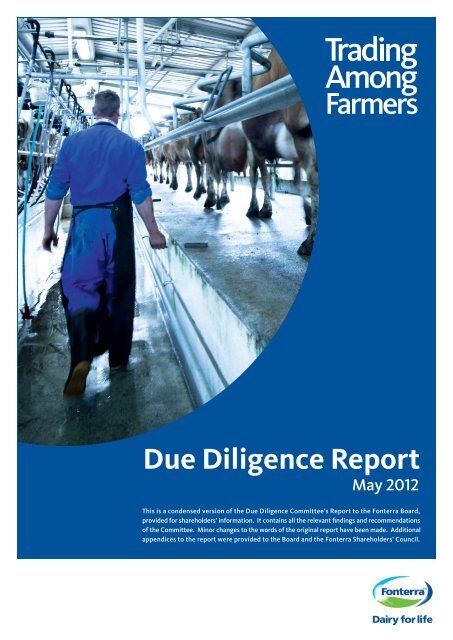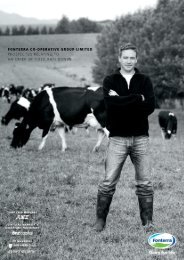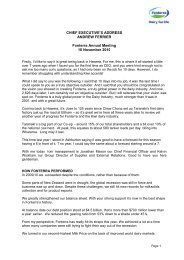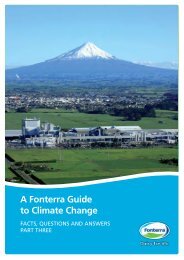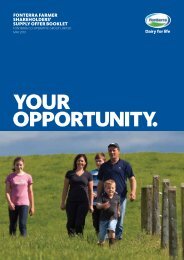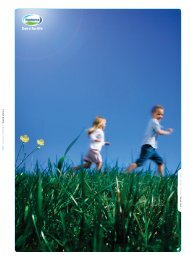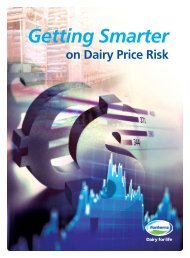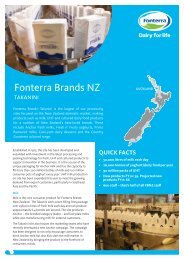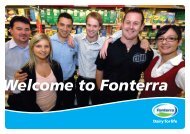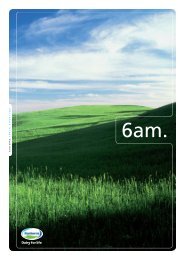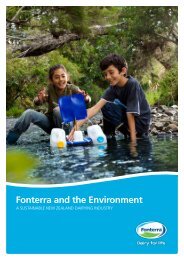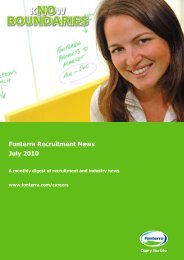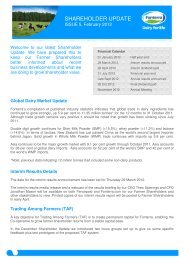Create successful ePaper yourself
Turn your PDF publications into a flip-book with our unique Google optimized e-Paper software.
3.2 Work PlanThe Committee adopted a comprehensive work plan describingthe various due diligence work streams to be addressed by theCommittee and its advisors. The Committee’s advisors providedinput on the scope of the work plan. The work plan identifies thefollowing critical work streams:(a) Co-operative Model(b) Milk Price(c) Process(d) Legal Issues(e) Financial/Markets (including Scenario Analysis)(f) Taxation(g) Constitutional(h) Control/Ownership(i) Fall-Back Plans(j) Legislation/Regulation(k) Satisfaction of Pre-conditions(l) BlueprintThe work plan also identifies the time frame for addressing thevarious work streams, actions and documents relating to the workstreams, and the advisor or advisors with primary responsibility foraddressing each work stream.3.3 Appointment of AdvisorsThe Committee appointed independent legal, tax, financial andindustry advisors to review and report on certain due diligencematters. These advisors are some of New Zealand’s leadingexperts in their respective fields. The Committee entered into anengagement letter with each of the advisors which described thepreliminary scope of the due diligence work to be undertaken bythe advisor. The Committee confirmed with each advisor that theyhad no conflict in connection with the performance of their workfor the Committee. A list of the advisors and their role in the duediligence process is described in more detail in Section 4 below.3.4 Information Shared with AdvisorsManagement and the Committee have provided detailed projectinformation (including copies of the Blueprint which outlinesthe key requirements for TAF) to the Committee’s advisors. TheBlueprint was the primary document reviewed by the advisors inthe due diligence process. Other information (including copies ofmanagement papers and reports and other relevant documents)was provided to the advisors who were also provided with allrelevant documentation that they requested. Advisors were alsogiven full access to, and an opportunity to discuss issues with,members of management and <strong>Fonterra</strong>’s advisors involved in theTAF implementation process.3.5 Meetings of the CommitteeThe Committee met formally on the following dates: 18 October2011, 27 October 2011, 14 November 2011, 9 December 2011,17 February 2012, 24 February 2012, 20 March 2012, 20 April 2012and 14 May 2012.The Committee’s advisors attended all meetings of the Committeeother than the initial meeting of the Committee after they hadbeen engaged by the Committee. 3 Representatives from <strong>Fonterra</strong>management also attended the meetings of the Committee.In addition to the meetings listed, the Committee and advisorsattended a meeting of the Capital Structure Committee on8 February 2012 at which <strong>Fonterra</strong>’s capital markets advisors,Oliver Wyman, presented and discussed a paper on the role ofthe Registered Volume Provider (“RVP”). At this meeting, theCommittee and advisors had the opportunity to discuss thispaper with representatives of Oliver Wyman. The Committeeand its advisors also attended the meeting of the CapitalStructure Committee on 12 March 2012 at which <strong>Fonterra</strong>’s TAFcapital markets advisors, Rothschild and Cameron Partners(“Rothschild/Cameron”), presented papers on launch of the<strong>Fonterra</strong> Shareholders’ Fund (the “Fund”) including an indicativeprocess for launching the Fund, management of Fund size, andunwind provisions. The Committee and its advisors were giventhe opportunity to discuss these papers with Rothschild/Cameronat the meeting. At the 12 March meeting of the Capital StructureCommittee, Professor Michael Cook, the Robert D. PartridgeProfessor of Co-operative Leadership, Division of Applied SocialSciences, University of Missouri, Columbia, Missouri, also gavea presentation on co-operatives that have changed their capitalstructure and the Committee and advisors were able to discussaspects of the presentation with Professor Cook at the meeting.3.6 Issues ListThe project manager for the Committee maintained a comprehensiveissues list with respect to the various due diligence work streamsthat enabled the Committee to monitor issues raised by the advisorsand the status of those issues. As issues were addressed bymanagement and its advisors, the “closed issues” were removedfrom the list, and the status of resolution of the issues andmanagement responses and actions were also incorporated in theissues list.3 Robin Oliver and Mike Shaw only attended the meetings of the Committee on 20 April 2012and 14 May 2012. Alan Galbraith only attended the meetings of the Committee on 27 October2011, 14 November 2011 and 20 April 2012.5
5 Major Issues IdentifiedA summary of the major issues identified by the Committee’sadvisors, together with the status of those issues, is set out below.The issues have been grouped under each of the due diligencework streams.5.1 Co-operative Model<strong>Report</strong>s from Professor Cook and PwC highlighted a number ofissues experienced by other co-operatives that had undertakencapital structure changes. While the TAF structure differs fromall those in the comparative sample, some learnings can be takenfrom them. In particular, the reports discussed examples wherethe rights of external investors invited to invest in a co-operativewere subsequently expanded beyond those originally envisaged.However, in many situations such examples were the result of acombination of factors not purely related to the capital structurechange, including major changes in strategy, aggressive use ofleverage, and poor governance.While TAF is unique, relevant observations from these reports tohelp minimise the prospect that farmer control is put at risk werethe need to maintain:i. The Fund size as low as practically possible to minimiseany exposure to the potential conflict between FarmgateMilk Price and profits, and to ensure <strong>Fonterra</strong>’s ability tobuyout the Fund if it does not perform as intended;ii. Strong responsible governance and prudent leveragepost TAF to avoid risks associated with aggressive debtfundedexpansion; andiii. A close relationship between ownership interest andsupply to maintain the co-operative nature of theenterprise.The Committee and its advisors were actively involved indiscussions with management regarding the Board’s proposedFund Risk Management Policy to help address the observationsnoted above (discussed further in Section 5.5 below).The sale of economic rights of some wet shares to the Fund willresult in some farmers having an economic interest in <strong>Fonterra</strong>that is not fully aligned with their supply. However, farmers alreadyhave the ability to buy shares above the share standard (i.e. dryshares), and TAF will now allow some farmers to hold shares belowthe share standard. Voting will remain aligned with production.The Committee is satisfied that by keeping the Fund size low,ownership interest will remain closely aligned with supply.5.2 Milk PriceGiven the absence of a market price for farmgate milk inNew Zealand, the basis on which the Milk Price is calculatedand governance over the Milk Price setting process will be offundamental importance to farmers and external investors. It isfundamental that the current process is robust and defendablein order to minimise the risk of challenge or adverse farmer orinvestor sentiment weighing on TAF.PwC undertook a high level review of the Milk Price Manual.Overall, PwC concluded that they do not consider there to be anymaterial changes required to <strong>Fonterra</strong>’s current approach anddo not consider there to be a more appropriate approach to setthe Milk Price under TAF. In reaching this view, PwC made thefollowing observations:i. The Milk Price Manual is the result of many years ofdevelopment of the key Principles and detailed rulesguiding their application which are used to calculate theMilk Price;ii. In PwC’s opinion a comprehensive process andgovernance structure (central to which are the MilkPrice Panel and independent Milk Price Group) has beenput in place to ensure that the Milk Price is calculatedin accordance with the Principles and that all areas ofuncertainty are thoroughly reviewed and independentlyverified so that the Milk Price is as robust and accurateas possible;iii. <strong>Fonterra</strong>’s Milk Price setting process and supportingstructures have been set up so as to ensure, as far aspossible, that any areas of subjectivity do not lead tobias. However, it is not possible to completely eliminateall areas of subjectivity from the calculation of the MilkPrice, and it is self-evident that small changes in theMilk Price can have a material impact on the level ofdistributable profit;iv. The most fundamental control over the Milk Pricesetting process is the <strong>Fonterra</strong> Board taking a long termview and understanding clearly the need for an accuratesplit between Milk Price and distributable profit in orderfor <strong>Fonterra</strong> to make appropriate investment decisionsand assessments of its underlying performance; andv. The Board will need to ensure that appropriate disclosureand transparency is maintained to maximise the level ofstakeholder confidence in the process.In addition, two of the Committee’s advisors reviewed the levelof Milk Price disclosure to determine whether it is appropriate.They have suggested a number of minor improvements to theFarmgate Milk Price Manual and Milk Price Statements designed7
to further strengthen the integrity of the Milk Price. These willbe considered by the Milk Price Group, and will form the basis ofrecommendations to the Milk Price Panel. If accepted, they willbe included in the next version of the Milk Price Statement to bereleased in September 2012. Comments in relation to the MilkPrice Manual will also be considered as part of the next updateof the Manual. These advisors have concluded that these twodocuments provide full and appropriate disclosure to the marketof the principles and procedures followed in setting the FarmgateMilk Price.The Committee is satisfied that issues associated with the MilkPrice have been considered and appropriately addressed.5.3 ProcessPwC has reviewed the internal control environment, such as theIT systems and trading platforms under which TAF will operate toensure it is appropriate, including assessing those aspects that willbe operated under contract by third parties.PwC has confirmed that the designed internal controls are suitable.A project plan has been developed comprising additional validationand testing activities to be undertaken prior to launch. PwC hasconfirmed that they have no reason to consider that the remainingproject activities set out in this plan will not be delivered inaccordance with the planned timetable.5.4 Legal IssuesA number of legal issues have been raised by Mr Oldfield duringthe due diligence process. Where relevant he has discussed theseissues with <strong>Fonterra</strong>’s legal advisor, Russell McVeagh, and soughtto resolve them by agreement.One legal issue remains outstanding in relation to the proposedmarket operator agreement with the NZX. The original terms of theproposed operator agreement could have permitted the NZX toissue rulings and waivers with respect to the FSM Rules in conflictwith the <strong>Fonterra</strong> Constitution. The NZX has agreed to includelanguage in the operator agreement that would require <strong>Fonterra</strong> toconsent to any such waivers or rulings provided such consent is notunreasonably withheld. The terms of the market operator agreementstill need to be approved by the Financial Markets Authority.Certain exemptions or waivers from regulators which may needto be granted to facilitate TAF remain outstanding, however thisis due to the structure of the offer and of the offer documents notbeing settled to the degree necessary to allow these exemptions orwaivers to be fully identified and applications made.5.5 Financial/MarketsA number of potential issues were identified in this work stream.These can be grouped as follows:i. Share Price;ii. Fund Size;iii. Managing Fund Size;iv. Fund Launch; andv. Fund Wind-up.Share PriceThe initial Fund unit price and subsequent trading price willbe important to the success of TAF. A price materially belowthe current Fair Value Share Price of $4.52 may not be viewedfavourably by farmers. Conversely, a higher unit price may putpressure on the Co-operative’s ability to attract new suppliers.The final initial unit price will be determined during the Fundlaunch process.Fund SizeThe Fund needs to be large enough to ensure appropriate liquidityand price discovery.The Dairy Industry Restructuring Amendment Bill (the “DIRA Bill”)introduced to Parliament on 27 March 2012 requires a minimumFund size of $500m, which at an issue price of $4.52 implies a Fundsize of approximately 8% of <strong>Fonterra</strong>’s total issued shares. Basedon analysis undertaken by <strong>Fonterra</strong>’s capital markets advisors,Rothschild/Cameron, which was reviewed and discussed by theCommittee and its advisors, the Committee is satisfied that a Fundsize of at least $500m should provide sufficient liquidity andprice discovery.Managing Fund SizeThe Fund size is intended to be dynamic, as farmers and the RVPwill have the ability to sell economic rights of shares to the Fund(which will result in units being issued) and to convert units intoshares (which will result in units being cancelled). The Form BConstitution provides that the size of the Fund shall not exceed 25%of all Co-operative shares on issue. However, it is critical for theBoard and management to ensure that the Fund size remains withinmanageable limits well below this threshold. Appropriate controlsand processes to manage the Fund size are therefore required.The proposed Fund Risk Management Policy sets out parametersunder which the <strong>Fonterra</strong> Board will manage the size of the Fund.Central to this is a target actual Fund size of 7-12% of issued sharesand a target potential Fund size of 7-15% of issued shares. Indetermining the target actual and potential Fund sizes, a balance8
Pre-condition 1: The Committee has concluded that this pre-conditionis able to be satisfied as of the date of this report on the following basis:(a) The Authorised Fund will be the Fund as described in theBlueprint and the Fund will meet the requirements ofthe definition of an Authorised Fund under the Form BConstitution. The Fund will be a unit trust established underthe Unit Trust Act 1960.iiiThe FSM rules which have been agreed with NZX (butwhich are awaiting approval from the FMA) and containdetailed requirements in relation to market conduct.The FSM will be a registered market and will be operated as aregistered exchange under the Securities Markets Act1988 which will require it to adopt and comply withcontinuous disclosure requirements.(b) The Fund will be established at or about the launch of TAF.(c) The Fund will have appropriate mechanisms, rulesand governance structures (which are summarised bymanagement in the Management <strong>Report</strong> and describedin detail in the Blueprint). The Committee’s advisors haveendorsed this view.(d) Terms sheets and other documents relating to the Fund havebeen reviewed by Mr. Oldfield and he has confirmed that heknows of no reason why the Fund cannot be established onthe terms presently contemplated at the date of this report.(e) Based on advice from Rothschild/Cameron, the Fund isreasonably likely to have sufficient number and dispersion ofFund units on issue so as to facilitate trading in those Fundunits. This view is endorsed by the Committee’s finance/markets advisors.(f) Rothschild/Cameron has advised that a Fund size of at least$500 million would provide a deep and liquid market.This view is also endorsed by the Committee’s finance/markets advisors.(g) The Committee’s advisors have confirmed that they arenot aware of any reason why this pre-condition has notbeen satisfied.Pre-condition 2: The Committee has concluded that thispre-condition is able to be satisfied as of the date of this reporton the following basis:(a) The market for trading Co-operative shares will be the FSMas described in the Blueprint and the FSM will meet therequirements of the definition of the FSM under the FormB Constitution. The FSM will be operated by NZX Limited(“NZX”).(b) The FSM will allow for trading of Co-operative shares in themanner set out in the Form B Constitution.iii The trading platform has been developed by NZX and isbased on the trading platform used by NZX for its own publicexchanges. The trading platform has been independentlyreviewed and confirmed by <strong>Fonterra</strong>’s capital markets advisor,Oliver Wyman.iv The share registry function for the FSM will, at the launchof TAF, include appropriate controls and functionality toenable trading activity and compliance with constitutionaland other limits and thresholds to be monitored.(d) Term sheets relating to the FSM have been reviewed byMr. Oldfield and he has confirmed that he knows of no reasonwhy the FSM cannot be established on the terms set out inthe term sheets.(e) Based on advice from its advisors and advice from <strong>Fonterra</strong>’scapital markets advisors, the Committee considers thatsufficient number and dispersion of Co-operative shares willbe on issue such that the FSM is reasonably likely to provide areliable and effective platform for the trading of Co-operativeshares. The Committee’s advisors have endorsed this view.(f) Liquidity in the FSM will be assisted by the RVP and by theability of farmer shareholders and the RVP to readily andwithout cost convert shares into units and vice-versa. TheRVP will be under obligations to buy and sell shares in theFSM within a defined maximum spread on a substantiallycontinuous basis. <strong>Fonterra</strong> has sought independent advicefrom Oliver Wyman, a leading international advisor in thisarea, on how to best structure the role of the RVP to enhanceliquidity in the FSM. This advice, which was reviewed andcommented on by the Committee’s financial/markets advisors,has provided the Committee with confidence that farmers willbe able to buy and sell shares in the FSM when they wish atprices that reflect a well informed and liquid market.(g) The Committee’s advisors have confirmed that they are notaware of any reason why this pre-condition has not been satisfied.(c) The FSM has appropriate mechanisms, rules and governancestructures (including as to liquidity, market conduct anddisclosure) which are summarised by management in theManagement <strong>Report</strong> and described in detail in the Blueprint.These mechanisms, rules and structures include:12
Pre-condition 3: The Committee has concluded that thispre-condition is able to be satisfied provided that certain criticalamendments to the DIRA Bill which were requested by <strong>Fonterra</strong>in its submission to the Primary Production Committee aremade to the DIRA Bill prior to enactment. The provisions of theDIRA Bill that management consider must be amended to enableimplementation of TAF, the concerns of <strong>Fonterra</strong> managementwith such provisions, and <strong>Fonterra</strong>’s proposed amendmentsto these provisions are described in detail in the Management<strong>Report</strong>. If these amendments are made to the DIRA Bill prior toenactment, the Committee are of the view that this pre-conditionwill be satisfied on an unqualified basis prior to the launch of TAF.The Committee believes that it will not be possible to implementTAF unless these amendments to the DIRA Bill are made. TheCommittee’s advisors have endorsed this view.Pre-condition 4: The Committee has concluded that thispre-condition is able to be satisfied (subject to the qualificationsoutlined below) as of the date of this report. The Committee notesthat certain waivers, approvals, consents and other confirmationfrom regulatory and other bodies which are required for theimplementation of TAF (which are described in detail in theManagement <strong>Report</strong>) have not yet been obtained. To the extentthat these waivers and approvals are necessary to enable thestructure of the FSM (including the RVP) and Fund to operateproperly, applications for these waivers and approvals will be filedwith the FMA and the Minister of Commerce. Other exemptionsand waivers relating to the structure of the offer of units in theFund and the offer documents have not yet been prepared or filedbecause in the view of Russell McVeagh, legal advisor to <strong>Fonterra</strong>,the structure of the offer documents and offering process has notyet been settled to the extent required to allow these exemptionsor waivers to be fully identified and applications made. Mr. Oldfieldconcurs with this view. In addition, OliverShaw have noted that<strong>Fonterra</strong> has obtained, or at this stage applied for, all appropriatetax rulings from the Inland Revenue Department addressing alltax issues relating to TAF for which a ruling would be appropriate.If the required waivers, approvals, consents, tax rulings and otherconfirmations identified required for the implementation of TAFare obtained, the Committee considers that pre-condition 4 will beable to be satisfied. The Committee and its advisors have no reasonto believe that such waivers, approvals, consents, tax rulings andother confirmations will not be obtained.8.2 100% Farmer Control and OwnershipThe Committee has also been requested to provide a view onwhether <strong>Fonterra</strong> will continue to be 100% controlled and ownedby its farmer supplier shareholders following the implementationof TAF. The Committee has concluded that implementation of TAFas described in the Blueprint will be consistent with the statementregarding 100% farmer control and ownership of the Co-operativecontained in Appendix 1. This view has been supported by opinionsfrom Alan Galbraith and Paul Oldfield on this issue, and theconclusions reached by management in the Management <strong>Report</strong>.8.3 Other Matters to be Addressedby the Committee under the Termsof ReferenceThe Terms of Reference require the Committee to report to theBoard in respect of a number of specific issues. Set out below is:i. A description of each issue;ii. The view of the Committee in respect of that issue; andiii. The grounds on which the Committee’s view is based.The Committee requested its advisors provide their views onwhether they consider that these requirements have been met inthe proposed structure of TAF. The Committee’s conclusions belowtake into account these views and the views of management oncertain of these objectives as detailed in the Management <strong>Report</strong>.8.4 Board ObjectivesThe Committee is required to report on whether the followingobjectives of the Board set out in the Terms of Reference areaddressed by the implementation of TAF. As of the date of this report:(a) Maintaining <strong>Fonterra</strong> as a sustainable co-operative with votingrights linked to milk supplied to <strong>Fonterra</strong>.The Committee has concluded that this objective has beenmet. Following the implementation of TAF as described in theBlueprint, voting rights in the Co-operative will remain tied tomilk supply. The Management <strong>Report</strong> highlighted certain areaswhere this fundamental concept has been enhanced and protectedin the Form B Constitution. The Committee considers that TAFwill enhance the sustainability of the Co-operative by providingpermanent share capital which will enable the Co-operative toeffectively execute its strategy.(b) Removing <strong>Fonterra</strong>’s obligation to redeem shares. This providespermanent share capital on which the business can operateand invest.13
The Committee has concluded that this objective has been met asof the date of this report. If TAF is implemented in accordance withthe requirements of the DIRA Bill, <strong>Fonterra</strong> will not be under anyobligation under DIRA to redeem Co-operative shares.(c) Ensuring <strong>Fonterra</strong> has sufficient permanent share capital to give<strong>Fonterra</strong> the funding needed to continue to have the ability todrive the highest sustainable returns to farmers.The Committee has concluded that this objective has been met.Under TAF, <strong>Fonterra</strong> will have a permanent share capital base sinceit will no longer be required under DIRA to redeem Co-operativeshares. This will improve <strong>Fonterra</strong>’s ability to drive the highestsustainable returns for its farmers.(d) Ensuring that the arrangements give farmers confidence thatthey will be able to buy and sell shares when they wish at pricesthat reflect a well informed and liquid market.The Committee has concluded that this objective has been met.Farmer shareholders will have access to the FSM through multiplemechanisms including the Fencepost trading site, a dedicated 0800number, or through use of a participating broker. It is proposedthat the FSM will be open for trading shares during business hourson every business day during the year. The Committee’s finance/markets advisors have advised that the FSM will likely provide areliable and effective platform for the trading of Co-operative shares.<strong>Fonterra</strong> has put in place an extensive TAF training plan targetedat farmers and rural professionals. The majority of this training willbe rolled out from August 2012 until the launch of TAF. To date, thefollowing training activities have taken place:i. Informal (pre-training) meetings with farmers on TAFhave been conducted by <strong>Fonterra</strong> Area Managers and/orspecialist TAF project team members;ii. CDs containing a TAF trading demo and simulationare being distributed to <strong>Fonterra</strong> Area Managers andCouncillors (system also to be available via Fencepost);iii. Trading demonstration sites have been operating at allField Days and other farmer meetings (e.g. the NetworkConference);iv. The May 2012 TAF Booklet was distributed to all farmersexplaining TAF and its structure and options to trade; andv. Fencepost material has been updated continuously,including FAQs.Future TAF training will include:i. TAF training on how to trade (approximately 100workshops are planned);ii. Quick-reference guide to be provided to every farmeras a ‘how to’ guide;iii. “Super-users” will be trained to train farmers and ruralprofessionals; andiv. Ongoing support from <strong>Fonterra</strong> Area Managers and TAFteam specialists will be provided at informal meetings,farmer meetings and Field Days.Consistent with our conclusion on pre-condition 2 relating to theFSM, TAF will provide a platform for the prices of Co-operativeshares to reflect a well informed and liquid market. The FSM will bea registered market and will be operated as a registered exchangeunder the Securities Markets Act 1988 which will require it to adoptand comply with continuous disclosure requirements. The FSMrules will require continuous disclosure of all material information.The RVP will enhance liquidity in the FSM. The RVP will be underobligations to buy and sell shares in the FSM within a definedmaximum spread on a substantially continuous basis. OliverWyman, a leading advisor in this area, has provided <strong>Fonterra</strong> withadvice on structuring the role of the RVP to enhance liquidity inthe FSM. This advice, which was reviewed and commented onby the Committee’s financial/markets advisors, has provided theCommittee with confidence that farmers will be able to buy andsell shares in the FSM when they wish at prices that reflect a wellinformed and liquid market.(e) Ensuring the arrangements produce a stable outcome in the sensethat they will meet the above objectives for the foreseeable future.The Committee has concluded that this objective has been met.The Committee is not aware of any reason why TAF would fail tomeet the objectives of TAF described above for the foreseeablefuture. The Committee considers that management has undertakenappropriate and robust scenario analysis to help ensure thatTAF can operate effectively in connection with a broad range ofpotential future circumstances and the Committee considersthat various TAF structures provide the Board with a means ofaddressing these circumstances.(f) Ensuring the Board can provide appropriate formal assurancesto the Shareholders’ Council that key issues raised by the Councilhave been addressed and that TAF is consistent with theco-operative principles endorsed by the Shareholders’ Council.The Committee has concluded that this objective has beenmet. The Committee is not aware of any key issue that has beenraised by the Council to date that has not been addressed bymanagement during the TAF implementation process to the extentthat such issue can be addressed at this stage in that process.The Committee considers that TAF is consistent with the currentco-operative principles of <strong>Fonterra</strong> for the reasons stated inparagraphs 1 – 5. below. In doing so, the Committee, however,notes that: (i) the <strong>Fonterra</strong> shareholders have already endorsedthe construct of TAF in the June 2010 vote; (ii) the co-operative14
principles are subject to change from time to time and may needto be updated to reflect the TAF structure; and (iii) the <strong>Fonterra</strong>shareholders have approved the issuance of dry shares tosupplier shareholders.(1) Shares in the Co-operative can only be held by supplyingshareholders. As discussed in connection with therequirement of 100% farmer control and ownership, theonly shareholders of the Co-operative can be farmers whosupply milk to <strong>Fonterra</strong>, those people who supplied milkto <strong>Fonterra</strong> but are selling down their shares over threeseasons, and the <strong>Fonterra</strong> Farmer Custodian, which will beultimately owned and controlled by farmers who supplymilk to <strong>Fonterra</strong> and hold Co-operative shares.(2) <strong>Fonterra</strong> supplying shareholders agree to the dual commitmentto supply milk and invest capital. Under TAF, our supplyingshareholders will continue to be required to supply milkand provide capital to the Co-operative.(3) Supplying shareholders will be issued and must hold Co-operativeshares in proportion to their total milksolids supplied. The<strong>Fonterra</strong> “share standard” requires a supplying shareholderto hold one Co-operative share for each kilogram of milksolids obtainable from milk supplied to the Co-operative.However, the Form B Constitution introduces the conceptof a three season rolling average for calculation of thelevel of supply and, following the introduction of TAF,the share standard will be able to be satisfied by suppliershareholders holding Co-operative shares and vouchersthat retain the voting rights of shares that have beentransferred to the Custodian so that economic rights canbe held for the Fund. The Form B Constitution will providethat supplying shareholders may hold Co-operative sharesequal to up to 200% of the required share standard (butsubject to the aggregate constitutional thresholds). TheCommittee does not consider that these changes areinconsistent with the underlying principle since anyadditional shares held in excess of the share standard donot entitle the supplying shareholder to any additionalvoting rights or milk price entitlement.(4) Control of <strong>Fonterra</strong> is exercised by its supplying shareholders whohave voting rights in proportion to their total milksolids supplied.As discussed in connection with the requirement of 100%farmer control and ownership, farmers who supply milk to<strong>Fonterra</strong> and who hold Co-operative shares and vouchersare the only people who can vote on Co-operative matterson the basis of and in proportion to their production andappoint and remove <strong>Fonterra</strong> Directors.(5) Financial benefits and obligations that arise from cornerstoneactivities are allocated to supplying shareholders in proportionto their total milksolids supplied. Under TAF, the financialbenefits and obligations from the Co-operative’s businesswill continue to be allocated to supplying shareholdersin proportion to their total milksolids supplied to theCo-operative. A particular supplier may elect to acquireadditional Co-operative shares up to 200% of the sharestandard, however, this entitlement to purchase additionalshares (and therefore increase the financial benefitsallocated to the shareholder) will still be calculated withreference to the amount of milksolids supplied to theCo-operative by the relevant supplier. The Committee doesnot consider that these changes are inconsistent with theunderlying principle.8.5 Other IssuesThe Committee is required to report on the following issues tothe extent relevant at this point in time in the process of theimplementation of TAF:(a) The TAF Project is being properly and reasonably managed inthe context of the Board’s timetable and objectives.The Committee has concluded that to date this objective has beenmet. The Committee considers that management is appropriatelymanaging all aspects of the TAF implementation process whichhave been required to be undertaken to date.(b) Appropriate expert advice has been taken on key aspects of theTAF Project and that key areas for advice have not been omitted.The Committee has concluded that this objective has been met inthe TAF implementation process to date. The Management <strong>Report</strong>and the Committee advisor reports indicate that suitable andappropriate levels of advice have been obtained. Additional advicewill still be required during the offering process and in connectionwith the preparation and verification of the offer documents.(c) Management and advisors have:i. Considered all material risks in connection with the TAFProject (including any new risks that have been identifiedby management and advisors since their prior reports inconnection with Capital Structure Stage 3 were deliveredto the Board) and have developed and provided a full riskanalysis and appropriate risk mitigation plans;ii. Undertaken appropriate scenario planning and stress testingin connection with the key areas of the TAF Project includingthe rules, structure and processes underlying the <strong>Fonterra</strong>Shareholders’ Market and the <strong>Fonterra</strong> Shareholders’ Fund.The Committee has concluded that this objective has been met.The Committee has put in place a robust and comprehensive duediligence process, and its advisors have confirmed that they havehad sufficient access to management and management’s ownadvisors to discuss issues identified. Material issues identifiedby the Committee’s advisors are summarised in Section 5 ofthis report, including the status of each issue. The Committee15
is satisfied that these issues have been suitably addressed bymanagement or are likely to be suitably addressed ahead ofthe launch of TAF. For example, management has developed aproposed Fund Risk Management Policy with respect to the sizeof the Fund and the balance sheet capacity required to adequatelymanage Fund size for approval by the Board. The Committee andits advisors provided material input on the terms of this policy. Inaddition, management has undertaken robust and comprehensivestress and scenario testing of the TAF structure (see Section 7 ofthis report), trading platform and related infrastructure to date.This testing on the trading platform and related infrastructure andcontrols will continue in the period leading up to the launch of TAF.(d) All changes necessary to be made to the <strong>Fonterra</strong> Constitutionto implement the TAF Project have been made and no additionalchanges are required to the <strong>Fonterra</strong> Constitution to successfullyimplement the TAF Project in a manner consistent with theobjectives of the Board.The Committee has concluded that this objective has been met.Based on review of the legal advice obtained by management todate, the Committee’s primary legal advisor, Mr. Oldfield, is notaware of any additional changes that are required to implementTAF as presently proposed. In his report, Mr. Oldfield noted that<strong>Fonterra</strong>’s legal advisors should be asked to confirm this in a formallegal opinion prior to the launch of TAF.(e) The documents provided to shareholders in connectionwith TAF and the offer documents:i. On the basis of legal advice received, comply with allrelevant legislation;ii. Are, in material respects, accurate and not misleadingand do not omit any material information;iii. Provide all information reasonably necessary forshareholders to form a reasoned judgement.Other than the TAF proposal booklet, meeting materials andconstitutional changes booklet distributed to shareholders inconnection with the June 2010 shareholder vote (“Initial TAFShareholder Documents”) and the May 2012 TAF Bookletwhich has been recently distributed to <strong>Fonterra</strong> shareholders,no other material documents relating to TAF have been issuedto shareholders as at the date of this report. The May 2012 TAFBooklet was not reviewed by the Committee or its advisors priorto release because that was considered to be unnecessary. Theoffering process has just commenced and no offer documentshave yet been prepared. The Committee expects to provide itsconclusions on this requirement in its Final <strong>Report</strong> to the Boardto be issued prior to the formal launch of TAF and followingcompletion of the preparation and verification of the offerdocuments and a comprehensive due diligence process relatingto the offer documents.Adequate consideration has been given to alternatives availableto <strong>Fonterra</strong>, and planning has been undertaken, in the event thatcircumstances arise which:i. Prevent the TAF Project being implemented after it isapproved; orii. Put the <strong>Fonterra</strong> balance sheet at risk prior to the TAFProject being implemented.In the period leading up to the June 2010 vote, the Boardconsidered a range of alternatives to the TAF structure that wasapproved by <strong>Fonterra</strong> shareholders in the June 2010 vote. In theevent that TAF is not implemented, the DIRA Bill provides that<strong>Fonterra</strong> will continue to be subject to the requirement to redeemCo-operative shares as this currently exists.(f) All necessary amendments to the Dairy Industry RestructuringAct 2001 and other legislative changes have been enacted toenable <strong>Fonterra</strong> to complete, and no changes to legislationwill prevent the completion of, the TAF Project in a mannerconsistent with the objectives of the Board.The Committee has addressed this requirement in its conclusionsrelating to pre-condition 3. As noted in those conclusions,the Committee noted that certain provisions of the DIRA Billrequired to be amended to enable implementation of TAF andthe Committee believes that it will not be possible to implementTAF unless these amendments to the DIRA Bill are made. TheCommittee’s advisors have endorsed this view.(g) Verification and other procedures have been established andimplemented to ensure the Shareholder Documents and the offerdocuments comply with item (e) above.The offering process has just commenced and no offer documentshave been prepared. As a result, the Committee is unable toprovide a view on this requirement at this time. The Committeeexpects to provide its conclusions on this requirement in its Final<strong>Report</strong> to the Board to be issued prior to the formal launch of TAFand following completion of the preparation and verification ofthe offer documents and a comprehensive due diligence processrelating to the offer documents.(h) <strong>Due</strong> diligence material is appropriately filed and all statementscontained in the Shareholder Documents and the offer documentsare cross referenced to appropriate due diligence material.The Committee has concluded that this objective has been met inthe TAF implementation process to date. The Committee expectsto provide its conclusions on this requirement in its Final <strong>Report</strong>to the Board to be issued prior to the formal launch of TAF andfollowing completion of the preparation and verification of theoffer documents and a comprehensive due diligence processrelating to the offer documents.16
9 ConclusionThe Committee has seen its role as being to provide comfort to theBoard in respect of the matters dealt with by this report. However,that does not affect the obligation of the Board to form its ownjudgement. This report is given solely for the benefit of the Directorsof <strong>Fonterra</strong>. No other person may rely on this report.This report has been approved unanimously by the members ofthe Committee.John WallerChairman of the Committee15 May 201217
Appendices to <strong>Report</strong> to the BoardShareholder information versionAppendix 1 – 100% Farmer Control and Ownership100% farmer control and ownership of the Co-operative<strong>Fonterra</strong> will be 100% farmer controlled and owned under Trading Among Farmers. 1100% farmer ownershipThis means that the only shareholders of the Co-operative can be: farmers who supply milk to <strong>Fonterra</strong>; those people who supplied milk to <strong>Fonterra</strong> but are selling down their shares over three seasons (exiting farmers); and the <strong>Fonterra</strong> Farmer Custodian, which will be ultimately owned and controlled by farmers who supply milk to <strong>Fonterra</strong> and holdCo-operative shares.If you look at <strong>Fonterra</strong>’s share register at the end of a trading day, you will only see as legal owners of Co-operative shares the peopledescribed above.<strong>Fonterra</strong> will be using a system approved by the Reserve Bank to transfer Co-operative shares between parties who are entitled to holdthem. As part of this approved system, shares may be temporarily held during the course of a day by approved market participants whoare subject to the rules of the <strong>Fonterra</strong> Shareholders’ Market.There have always been and will continue to be people who have beneficial rights in Co-operative shares – such as the beneficiaries of afamily trust or passive investors in a farm syndicate. This will not change under Trading Among Farmers.Under Trading Among Farmers both the FSF and the RVP will have beneficial rights in Co-operative shares. However, they will not be legalowners of Co-operative shares.100% farmer controlThis means that farmers who supply milk to <strong>Fonterra</strong> and who hold Co-operative shares are the only people who can: vote on Co-operative matters on the basis of their share-backed production; and appoint and remove <strong>Fonterra</strong> directors.However if Directors or farmer shareholders try to take an action which will adversely affect the rights of the <strong>Fonterra</strong> Shareholders’ Fundor the Registered Volume Provider, then those parties may have legal rights to take steps to protect their interests. Under the terms of thedocumentation constituting Trading Among Farmers, those steps would be taken in the name of the <strong>Fonterra</strong> Farmer Custodian.1 As set out in TAF Blueprint (version 3.9)18
Appendix 2 – Committee Termsof Reference<strong>Fonterra</strong> Co-operative Group LimitedCapital Structure – Trading Among Farmers <strong>Due</strong> <strong>Diligence</strong>CommitteeTerms of ReferenceDecember 20111 ConstitutionThe Board of <strong>Fonterra</strong> Co-operative Group Limited (“<strong>Fonterra</strong>”)has resolved to establish a Committee to be known as the CapitalStructure – Trading Among Farmers <strong>Due</strong> <strong>Diligence</strong> Committee(“the Committee”).2 ObjectivesThe objectives of the Committee will be to:To review proposals, processes, and shareholder communicationsand offer documents relating to the implementation of TradingAmong Farmers (“TAF”) and to assist the Board to ensure that:(a) In light of assurances that have been given by the Board andmanagement to <strong>Fonterra</strong> shareholders, that <strong>Fonterra</strong> willcontinue to be 100% owned and controlled by its shareholdersfollowing the implementation of TAF (the “Project”).(b) Directors fulfil their duties in relation to the Project.(c) Appropriate “due diligence” is undertaken at each remainingstage of the Project.(d) The Board has adopted a due diligence process that isappropriate in the circumstances, robust and defendable.(e) The Board’s objectives in proposing the Project and thepre-conditions to commencement of TAF contained in the<strong>Fonterra</strong> Constitution have been addressed in a mannersatisfactory to the Board.(f) The Board can provide appropriate formal assurances to theShareholders’ Council that key issues raised by the Councilhave been addressed and that the Project is consistent with theco-operative principles endorsed by the Shareholders’ Council.(g) All documents sent to shareholders and the offer documentsrelating to <strong>Fonterra</strong> shares and the units in the <strong>Fonterra</strong>Shareholders’ Fund (“Offer Documents”) comply with allrelevant legislation; are, in all material respects, accurate andnot misleading and do not omit any material information; andprovide all information reasonably necessary for shareholdersto form a reasoned judgment on the proposals.(h) The Project is consistent with communications made to<strong>Fonterra</strong> shareholders and other stakeholders including theNew Zealand Government.3 Duration of ReviewThe Committee will operate during the remaining stages of theProject (i.e. up to and including the commencement of the <strong>Fonterra</strong>Shareholders’ Market and the issuance of units in the <strong>Fonterra</strong>Shareholders’ Fund).4 MembershipThe Committee shall consist of five Directors:(a) Three Directors elected to the Board under clause 12.2of the Constitution (“Elected Directors”);(b) Two Directors appointed to the Board under clause 12.4of the Constitution (“Appointed Directors”);The Chairman of <strong>Fonterra</strong> will be an ex officio member of theCommittee. The Committee Chair shall be appointed by the Board.5 AuthorityThe Committee is authorised by the Board to undertake anyactivity within its Terms of Reference.The Committee is authorised by the Board to obtain independentprofessional advice and to secure the attendance at meetings ofpersons with relevant experience or expertise if it considersthis necessary.6 <strong>Report</strong>ingThe Committee will provide the following reports to the Board:(a) An report prior to enactment of the legislative changesto Dairy Industry Restructuring Act (“DIRA”) required toimplement TAF (currently expected to occur in April/May2012);(b) A final report prior to issuance of the Offer Documents(currently planned for November 2012); and(c) Any other report that the Board may request from time to time.All minutes of Committee meetings will be provided to the Board.The Committee will, at the request of the Chairman of the Board,present the Committee’s report to the Shareholders’ Council.19
7 Responsibilitiesof the CommitteeThe Committee shall address the following issues in its final reportto the Board and in earlier reports to the extent relevant:(a) The objectives of the Board set out below are addressed inthe Project:i. Maintaining <strong>Fonterra</strong> as a sustainable co-operative withvoting rights linked to milk supplied to <strong>Fonterra</strong>.ii. Removing <strong>Fonterra</strong>’s obligation to redeem shares. Thisprovides permanent share capital on which the businesscan operate and invest.iii. Ensuring <strong>Fonterra</strong> has sufficient permanent share capitalto give the Co-operative the funding needed to continueto have the ability to drive the highest sustainablereturns to farmers.iv. Ensuring that the arrangements give farmers confidencethat they will be able to buy and sell shares when theywish at prices that reflect a well informed and liquidmarket.v. Ensuring the arrangements produce a stable outcomein the sense that they will meet the above objectives forthe foreseeable future.These objectives are underpinned by the ongoing need to giveshareholders and other stakeholders confidence around thedetermination of the Milk Price.(b) The Project is being properly and reasonably managed in thecontext of the Board’s timetable and objectives.(c) Appropriate expert advice has been taken on key aspectsof the Project and that key areas for advice have not beenomitted.(d) Management and advisors have:i. Considered all material risks in connection with theProject (including any new risks that have been identifiedby management and advisors since their prior reports inconnection with Capital Structure Stage 3 were deliveredto the Board) and have developed and provided a full riskanalysis and appropriate risk mitigation plans;(e) All changes necessary to be made to the <strong>Fonterra</strong>Constitution to implement the Project have been madeand no additional changes are required to the <strong>Fonterra</strong>Constitution to successfully implement the Project in amanner consistent with the objectives of the Board.(f) All documents provided to shareholders in connection withthe Project and all Offer Documents:i. On the basis of legal advice received, comply with allrelevant legislation;ii. Are, in material respects, accurate and not misleadingand do not omit any material information;iii. Provide all information reasonably necessary forshareholders to form a reasoned judgment.(g) Adequate consideration has been given to alternativesavailable to <strong>Fonterra</strong>, and planning has been undertaken, inthe event that circumstances arise which:(a) Prevent the Project being implemented after it is approved; or(b) Put the <strong>Fonterra</strong> balance sheet at risk prior to the Projectbeing implemented.(h) That all necessary amendments to Dairy IndustryRestructuring Act (DIRA) and other legislative changes havebeen proposed/enacted to enable <strong>Fonterra</strong> to complete, andno changes to legislation will prevent the completion of, theProject in a manner consistent with the objectives of theBoard (if such amendments or changes have been proposed/enacted at the time of the relevant report).(i) Verification and other procedures have been established andimplemented to ensure additional documentation sent toshareholders and the Offer Documents comply with paragraph7(f) above.<strong>Due</strong> diligence material is appropriately filed and all statementscontained in additional documents provided to shareholders andthe Offer Documents are cross referenced to appropriate duediligence material.ii. Undertaken appropriate scenario planning and stresstesting in connection with the key areas of the Projectincluding the rules, structure and processes underlyingthe <strong>Fonterra</strong> Shareholders’ Market and the <strong>Fonterra</strong>Shareholders’ Fund.20
8 MeetingsThe Committee shall meet at such times as the Committee Chairshall deem necessary in order to fulfil its duties. The Committeeshall regulate its meeting in the manner it sees fit.9 ConfidentialitySubject to the reporting requirements set out in these Termsof Reference, all deliberations of the Committee shall remainconfidential unless otherwise agreed by the Chair of the Committee.10 SecretariatThe Chair of the Committee shall from time to time appointa Secretary.21
Appendix 3 – Profilesof AdvisorsAlan Galbraith QCAlan is one of New Zealand’s leading commercial Queen’s Counsel.Alan attended Auckland Grammar School before commencing hislaw degree at Auckland University where he graduated with an LLB(Hons). He was awarded a Rhodes Scholarship in 1967 and attendedOxford University where he gained a BCL in 1970. Alan went to theBar in 1979 and was appointed a Queen’s Counsel in 1987. Public & Administrative Law Reform Committee member -1985-1987 Legislation Advisory Committee member - 1987-1996 Deputy Chairman, New Zealand Broadcasting Commission -1989-1993 Member, New Zealand Racing Authority - 1990-1992 Member, New Zealand Racing Industry Board - 1992-1996 Member, New Zealand Totalisator Agency Board - 1996 Deputy Chairperson, Sports Tribunal - May 2008-August 2012Alan has appeared as counsel in commercial litigation on behalf of AirNew Zealand, Auckland City Council, Auckland International AirportLimited, Bank of New Zealand, Brierley Investments Limited, Cards NZLimited, the Commerce Commission, Feltex Carpets directors, Fisher& Paykel Limited, Fletcher Challenge Limited, Lion Nathan, ManukauCity Council, National Provident Fund, Natural Gas Corporation, PerryCorporation Limited, PPCS Limited, and Vector Limited.Colin Giffney, Principal, Giffney & JonesColin’s career began in 1971 in the research department of theforerunner firm to Goldman Sachs/JB Were - Jordan SandmanSmythe. Later, returning from 4 years in London he became apartner at the same firm in 1978. He specialised in research andcorporate advisory work. He became managing director in 1986,and retired in 1995 to start niche investment bank Giffney & Jones.Giffney & Jones specialises in mergers and acquisitions. He iscurrently deputy chairman of the Takeovers Panel, a member of theFinancial Markets Authority, chairman of small listed companies,Renaissance Corporation and Solution Dynamics, and a directorof several other companies. He is on the Listing Subcommittee ofthe NZX and was formerly a member of the New Zealand StockExchange’s Market Surveillance Panel. He has over 40 yearsexperience in New Zealand’s capital markets.Murray Gough OBEMurray was the Chief Executive Officer of the New Zealand DairyBoard from 1985 to 1992. He is currently Chairman of Rangatira Limited,Precision Dispensing Systems Limited and Cosine Public Health Networkand a director of Rural Equities Limited. He was formerly a director ofAMP, Anzco Foods, Auckland Milk Corporation, Dunlop Living, ForestryCorporation, Kiwi Dairies, Kiwifruit Marketing Board, Medic Corporation,Sealord Group, Te Kairanga Wines, Tasman Agriculture, Tui Milk Products,Wakefield Hospital, and Williams and Kettle.Eric Lucas, Partner – Corporate Finance and Forensic Services,PricewaterhouseCoopersEric is a Corporate Finance Partner at PwC, specialising in complexvaluation issues, investigatory work and dispute resolution withPwC. He is responsible for the Firm’s Forensic Services Practice inNew Zealand.He has presented expert evidence in the New Zealand High Courton numerous occasions, as well as provision of expert evidence atarbitrations and mediations. He also has experience, acting as Expert,nominated by both the New Zealand Institute of Chartered Accountantsand by direct appointment in determining commercial disputes.Eric has provided valuation and advisory services to a wide range ofcompanies in relation to: Business Acquisitions and Mergers Sale of Businesses Share and Business ValuationsQualifications and Professional Associations BA (Hons), University of Lancaster, England Fellow of the Institute of Chartered Accountants in Englandand Wales Chartered Accountant, New Zealand Institute of CharteredPaul Nickels, Partner – Risk and Control Solutions,PricewaterhouseCoopersPaul brings 17 years experience, with 9 as a partner. He is responsiblefor PwC’s systems assurance practice in New Zealand and leadsPwC’s Auckland risk and control team.He is an expert in his area and regularly consults to a broad rangeof organisations on technology risk and change initiatives. Paul’sareas of expertise include: Board risk governance reviews Risk management IT security Third party independent assurance Internal controls design, implementation and independentassessment Providing quality assurance over large systems projects Internal Audit establishment and operation22
Qualifications and Professional Associations BA Hons Accounting and Finance, University of Essex B Com (Business Studies), University of East Anglia Certified Information Systems Auditor (CISA) Past president Auckland Chapter of ISACA Member of NZICAPaul Oldfield, Director, Harmos Horton Lusk LimitedPaul specialises in securities offerings, company, business and assetacquisitions and disposals, financing, and complex contractualarrangements.Robin Oliver MNZM, Director of OliverShaw, Tax AdvisorsRobin is a very experienced tax practitioner with a reputationfor bringing different perspectives (private and public sector,practitioner and manager) and disciplines (legal, accounting andeconomics) to issues. Robin holds a Master of Arts degree with firstclass Honours and a Bachelor of Laws degree from the Universityof Auckland. He has undertaken additional studies in economics,accounting and management.Mike Shaw CA, Director of OliverShaw, Tax AdvisorsMike is a very experienced tax practitioner with a strongreputation in tax policy and structuring advice having advisedhigh wealth individuals, large corporates, the Corporate TaxpayersGroup, Ministers of the Crown and Government policy officials.He was previously a senior tax partner at Deloitte until November2010 and was a member of the Tax Working Group that reported tothe Government in 2010.Before becoming a tax partner he was seconded to the office offive different Ministers’ of Revenues as their in house personal taxpolicy adviser.Mike has publicly represented a number of Institute of CharteredAccountant continuing education courses.Over his career, Mike has commented on most areas of taxationlaw and policy.He was Deputy Commissioner of New Zealand’s InlandRevenue Department from 1995 to November 2011. As DeputyCommissioner of Inland Revenue, Robin was a member of theNew Zealand Inland Revenue Executive Board and subsidiarybodies overseeing the strategic direction and management of theDepartment. For services in that role he was appointed by theQueen a Member of the New Zealand Order of Merit in the 2009Queens’s birthday Honours list. In 2009, Robin was appointed bythe Secretary General of the United Nations to the UN Committeeof Experts on International Tax Co-operation, a position he stillholds. He has also been a member of the International MonetaryFund’s expert group on taxation.In addition to this public sector role, Robin is a leading technicalexpert on taxation. He is the co-author of New Zealand’s leadingtext on the taxation of financial instruments which has beenquoted as authoritative in both the Privy Council and NewZealand’s Supreme Court. He was appointed a member of theNew Zealand government’s 1988 Consultative Committee on theTaxation of Superannuation and Life Insurance. He was on theSecretariat of the Consultative Committee on the Taxation ofIncome from Capital (1989-91).His skill set embraces all aspects of taxation policy, taxadministration, international tax and the taxation of the financialsector. Over his career, Robin has commented on most areas oftaxation law and policy.23


